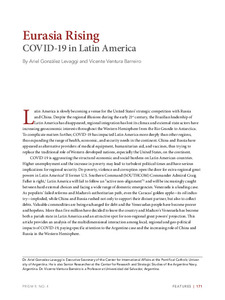Please use this identifier to cite or link to this item:
https://repositorio.uca.edu.ar/handle/123456789/15206| Título: | Eurasia rising: COVID-19 in Latin America | Autor: | González Levaggi, Ariel Ventura Barreiro, Vicente |
Palabras clave: | COVID 19; GEOPOLITICA; RELACIONES INTERNACIONALES; COOPERACION INTERNACIONAL | Fecha de publicación: | 2021 | Editorial: | National Defense University Press | Cita: | Gonzalez-Levaggi, A., Ventura Barreiro, V. Eurasia rising: COVID-19 in Latin America [en línea]. Prism. 2021, 9 (4). Disponible en: https://repositorio.uca.edu.ar/handle/123456789/15206 | Resumen: | L atin America is slowly becoming a venue for the United States’ strategic competition with Russia and China. Despite the regional illusions during the early 21st century, the Brazilian leadership of Latin America has disappeared, regional integration has lost its climax and external state actors have increasing geoeconomic interests throughout the Western Hemisphere from the Rio Grande to Antarctica. To complicate matters further, COVID-19 has impacted Latin America more deeply than other regions, thus expanding the range of health, economic, and security needs in the continent. China and Russia have appeared as alternative providers of medical equipment, humanitarian aid, and vaccines, thus trying to replace the traditional role of Western developed nations, especially the United States, on the continent. COVID-19 is aggravating the structural economic and social burdens on Latin American countries. Higher unemployment and the increase in poverty may lead to turbulent political times and have serious implications for regional security. Do poverty, violence and corruption open the door for extra-regional great powers in Latin America? If former U.S. Southern Command (SOUTHCOM) Commander Admiral Craig Faller is right,1 Latin America will fail to follow an “active non-alignment”2 and will be increasingly caught between hard external choices and facing a wide range of domestic emergencies. Venezuela is a leading case. As populists’ failed reforms and Maduro’s authoritarian path, even the Caracas’ golden apple—its oil industry—imploded, while China and Russia rushed not only to support their distant partner, but also to collect debts. Valuable commodities are being exchanged for debt and the Venezuelan people have become poorer and hopeless. More than five million have decided to leave the country and Maduro’s Venezuela has become both a pariah state in Latin America and an attractive spot for non-regional great powers’ projection. This article provides an analysis of the multidimensional interaction among local, regional and geo-political impacts of COVID-19, paying specific attention to the Argentine case and the increasing role of China and Russia in the Western Hemisphere... | Cobertura Espacial: | América Latina China Rusia Argentina Estados Unidos |
URI: | https://repositorio.uca.edu.ar/handle/123456789/15206 | ISSN: | 2157- 0663 | Disciplina: | CIENCIA POLITICA | Derechos: | Acceso abierto | Fuente: | Prism. 2021 Vol.9, No.4, 2021 |
| Appears in Collections: | Artículos |
Files in This Item:
| File | Description | Size | Format | |
|---|---|---|---|---|
| eurasia-rising-covid-19.pdf | 731,19 kB | Adobe PDF |  View/Open |
Page view(s)
63
checked on Apr 27, 2024
Download(s)
38
checked on Apr 27, 2024
Google ScholarTM
Check
This item is licensed under a Creative Commons License

